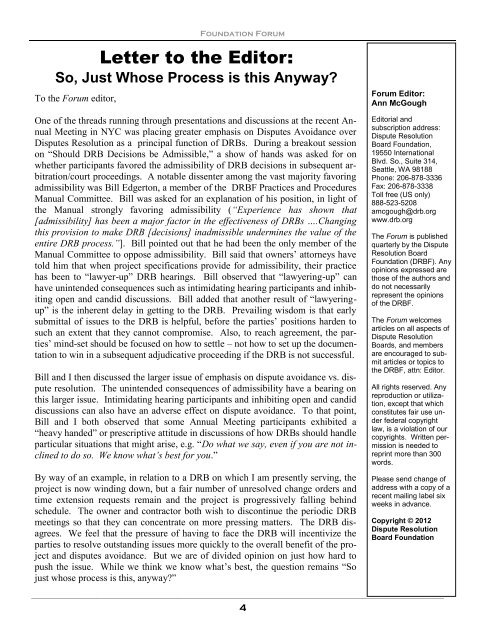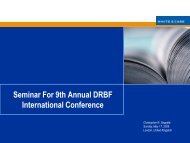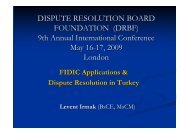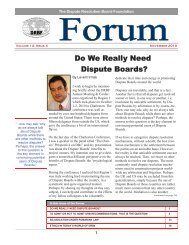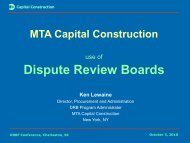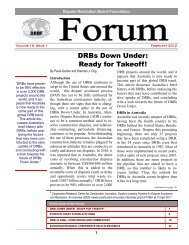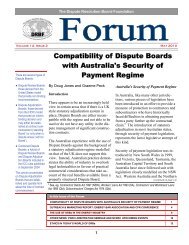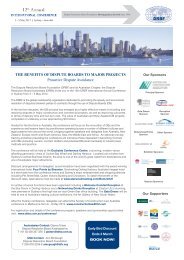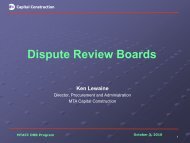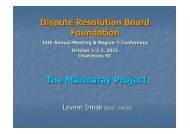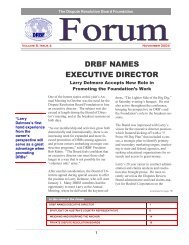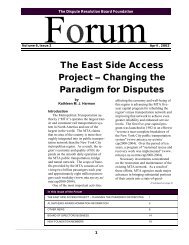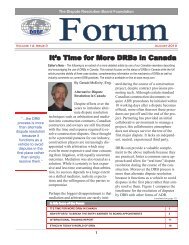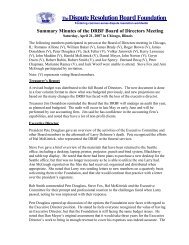Dispute Boards: East vs. West - Dispute Resolution Board Foundation
Dispute Boards: East vs. West - Dispute Resolution Board Foundation
Dispute Boards: East vs. West - Dispute Resolution Board Foundation
Create successful ePaper yourself
Turn your PDF publications into a flip-book with our unique Google optimized e-Paper software.
<strong>Foundation</strong> Forum<br />
Letter to the Editor:<br />
So, Just Whose Process is this Anyway?<br />
To the Forum editor,<br />
One of the threads running through presentations and discussions at the recent Annual<br />
Meeting in NYC was placing greater emphasis on <strong>Dispute</strong>s Avoidance over<br />
<strong>Dispute</strong>s <strong>Resolution</strong> as a principal function of DRBs. During a breakout session<br />
on “Should DRB Decisions be Admissible,” a show of hands was asked for on<br />
whether participants favored the admissibility of DRB decisions in subsequent arbitration/court<br />
proceedings. A notable dissenter among the vast majority favoring<br />
admissibility was Bill Edgerton, a member of the DRBF Practices and Procedures<br />
Manual Committee. Bill was asked for an explanation of his position, in light of<br />
the Manual strongly favoring admissibility (“Experience has shown that<br />
[admissibility] has been a major factor in the effectiveness of DRBs ….Changing<br />
this provision to make DRB [decisions] inadmissible undermines the value of the<br />
entire DRB process.”]. Bill pointed out that he had been the only member of the<br />
Manual Committee to oppose admissibility. Bill said that owners’ attorneys have<br />
told him that when project specifications provide for admissibility, their practice<br />
has been to “lawyer-up” DRB hearings. Bill observed that “lawyering-up” can<br />
have unintended consequences such as intimidating hearing participants and inhibiting<br />
open and candid discussions. Bill added that another result of “lawyeringup”<br />
is the inherent delay in getting to the DRB. Prevailing wisdom is that early<br />
submittal of issues to the DRB is helpful, before the parties’ positions harden to<br />
such an extent that they cannot compromise. Also, to reach agreement, the parties’<br />
mind-set should be focused on how to settle – not how to set up the documentation<br />
to win in a subsequent adjudicative proceeding if the DRB is not successful.<br />
Bill and I then discussed the larger issue of emphasis on dispute avoidance <strong>vs</strong>. dispute<br />
resolution. The unintended consequences of admissibility have a bearing on<br />
this larger issue. Intimidating hearing participants and inhibiting open and candid<br />
discussions can also have an adverse effect on dispute avoidance. To that point,<br />
Bill and I both observed that some Annual Meeting participants exhibited a<br />
“heavy handed” or prescriptive attitude in discussions of how DRBs should handle<br />
particular situations that might arise, e.g. “Do what we say, even if you are not inclined<br />
to do so. We know what’s best for you.”<br />
By way of an example, in relation to a DRB on which I am presently serving, the<br />
project is now winding down, but a fair number of unresolved change orders and<br />
time extension requests remain and the project is progressively falling behind<br />
schedule. The owner and contractor both wish to discontinue the periodic DRB<br />
meetings so that they can concentrate on more pressing matters. The DRB disagrees.<br />
We feel that the pressure of having to face the DRB will incentivize the<br />
parties to resolve outstanding issues more quickly to the overall benefit of the project<br />
and disputes avoidance. But we are of divided opinion on just how hard to<br />
push the issue. While we think we know what’s best, the question remains “So<br />
just whose process is this, anyway?”<br />
Forum Editor:<br />
Ann McGough<br />
Editorial and<br />
subscription address:<br />
<strong>Dispute</strong> <strong>Resolution</strong><br />
<strong>Board</strong> <strong>Foundation</strong>,<br />
19550 International<br />
Blvd. So., Suite 314,<br />
Seattle, WA 98188<br />
Phone: 206-878-3336<br />
Fax: 206-878-3338<br />
Toll free (US only)<br />
888-523-5208<br />
amcgough@drb.org<br />
www.drb.org<br />
The Forum is published<br />
quarterly by the <strong>Dispute</strong><br />
<strong>Resolution</strong> <strong>Board</strong><br />
<strong>Foundation</strong> (DRBF). Any<br />
opinions expressed are<br />
those of the authors and<br />
do not necessarily<br />
represent the opinions<br />
of the DRBF.<br />
The Forum welcomes<br />
articles on all aspects of<br />
<strong>Dispute</strong> <strong>Resolution</strong><br />
<strong><strong>Board</strong>s</strong>, and members<br />
are encouraged to submit<br />
articles or topics to<br />
the DRBF, attn: Editor.<br />
All rights reserved. Any<br />
reproduction or utilization,<br />
except that which<br />
constitutes fair use under<br />
federal copyright<br />
law, is a violation of our<br />
copyrights. Written permission<br />
is needed to<br />
reprint more than 300<br />
words.<br />
Please send change of<br />
address with a copy of a<br />
recent mailing label six<br />
weeks in advance.<br />
Copyright © 2012<br />
<strong>Dispute</strong> <strong>Resolution</strong><br />
<strong>Board</strong> <strong>Foundation</strong><br />
———————————————————————————————————————————————————<br />
4


